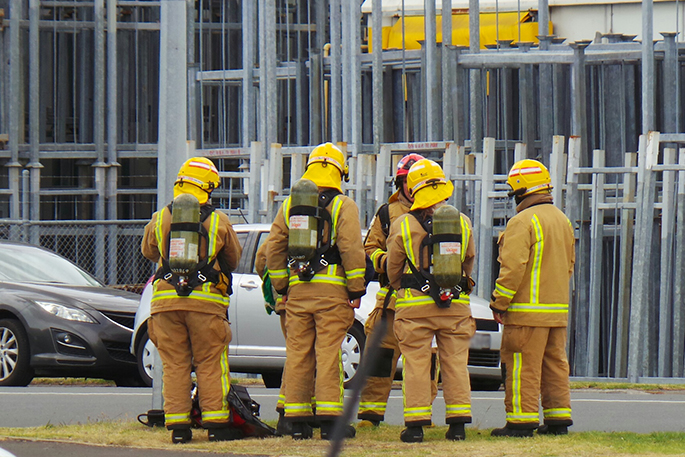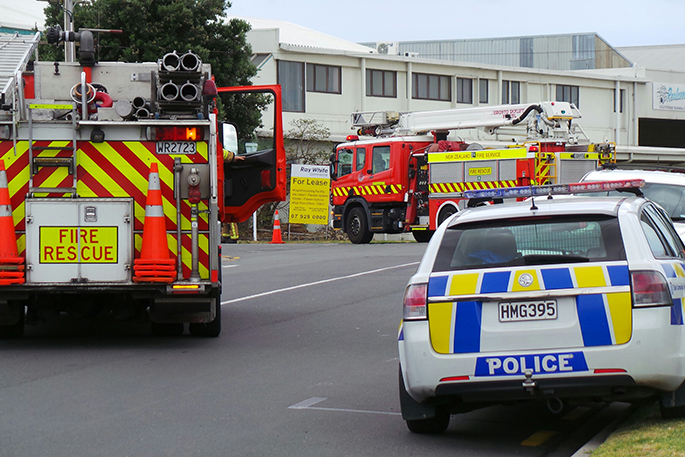Updated 5pm: Hundreds of people ordered out of their workspaces after 1pm today because of an ammonia leak in a freezing plant at Mark Road, are now being allowed to retrieve their property and vehicles.
The block between Triton Ave and Hull Road from Mark Road down to Tukorako Drive was evacuated earlier because of the cloud of ammonia fumes being blown downwind from Realcool in Mark Road.
Police are believed to be dropping some cordons from about 4.30pm, although parts of Triton Avenue remain closed to traffic.
Fire services remain at the scene while the clean up of an ammonia leak continues.
A police spokeswoman says the cordon has been reduced and most people have returned to their buildings, except for those within the immediate vicinity of the leak.
Police assisted with the evacuations but are no longer on the scene.
Earlier:
Businesses in the Mount Maunganui area are being evacuated this afternoon after an Ammonia spill on Mark Road.
Police are also at the scene and are working on putting cordons in place.
It's a significant leak and uncontrolled at Realcool Cold Storage Ltd, says Northern Fire Communications shift manager Dallas Ramsay.
Police are handling traffic control and the evacuating of surrounding areas.
Cordons are being put in place on Hull Road, through to Tukorako Drive and Totara Street, as well as Triton Avenue and the smaller streets within that area.

'In the meantime if people can just ensure their windows are kept shut and they stay indoors,” says Dallas.
Firefighters from Tauranga and Mount Maunganui are dealing with the leak and a hazmat command unit is en-route from Rotorua.
Police are asking people within this area to leave their properties as soon as possible.
The spill will take a number of hours to clean up.
"We ask that people please follow the instructions of Police in the area and evacuate immediately," say police.
At the scene?
Call 0800 SUNLIVE or email photos to newsroom@thesun.co.nz
Facts about ammonia
Ammonia is a colorless gas with a very distinct smell.
The ammonia smell is familiar to many people because ammonia is used in smelling salts, many household and industrial cleaners, and window-cleaning products. Ammonia gas can be dissolved in water.
This kind of ammonia is called liquid ammonia or aqueous ammonia. Once exposed to open air, liquid ammonia quickly turns into a gas.
Ammonia is a strong, colorless gas. Poisoning may occur if you breathe in ammonia. Poisoning may also occur if you swallow or touch products that contain very large amounts of ammonia.
Ammonia, frequently used commercially in large freezing and refrigeration plants is also called 'anhydrous ammonia” because it contains almost no water it is 99.98 per cent pure.
Household ammonia is only about 10 per cent ammonia by weight mixed with water. Ammonia is poisonous in high concentrations.
Two factors, however, mitigate the risk: ammonia's distinctive smell is detectable at concentrations well below those considered to be dangerous, and ammonia is lighter than air, so if any does leak, it will rise and dissipate in the atmosphere.
The higher the vapor pressure the higher concentration of the substance in air. Ammonium Hydroxide is not combustible, however, in a fire Ammonia vapors are formed that can be ignited and may result in an explosion.
Use dry chemical, CO2, water spray or foam as extinguishing agents.
Symptoms
Airways, lungs, and chest: Cough, Chest pain (severe), Chest tightness, Difficulty breathing, Rapid breathing, Wheezing
Body-wide: Fever
Eyes, ears, nose, mouth, and throat: Tearing and burning of eyes Temporary blindness, Throat pain (severe) Mouth pain, Lip swelling
Heart and blood: Rapid, weak pulse, Collapse and shock
Nervous system: Confusion, Difficulty walking, Dizziness, Lack of coordination, Restlessness Stupor (altered level of consciousness)
Skin: Bluish-colored lips and fingernails Severe burns if contact is longer than a few minutes
Stomach and gastrointestinal tract: Severe stomach, pain Vomiting



0 comments
Leave a Comment
You must be logged in to make a comment.